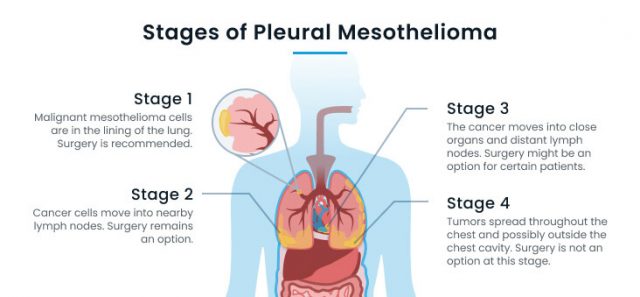Mesothelioma is a rare and aggressive form of cancer that affects the mesothelial cells lining various organs in the body, particularly the lungs, abdomen, and heart. Metastatic pleural mesothelioma is a specific type of mesothelioma that has spread from its origin in the pleura, the lining of the lungs, to other parts of the body. While there is no cure for metastatic pleural mesothelioma, several treatment options are available to manage the disease, alleviate symptoms, and potentially extend survival.
Pleural Mesothelioma Treatment

Treating pleural mesothelioma, a cancer that originates in the lining of the lungs, requires a multidisciplinary approach involving various medical professionals and treatment modalities.
Surgery
Surgery is often considered the primary treatment option for early-stage pleural mesothelioma. The goal of surgery is to remove as much of the visible tumor as possible. Common surgical procedures for pleural mesothelioma include:
Pleurectomy/Decortication
This procedure involves removing the diseased pleura (lining of the lungs) and any visible tumors while sparing the lungs themselves. It is typically performed for early-stage mesothelioma and can provide relief from symptoms like chest pain and shortness of breath.
Extrapleural Pneumonectomy (EPP)
In this more extensive surgery, the affected lung, the diseased pleura, a portion of the diaphragm, and nearby lymph nodes are removed. EPP is a high-risk procedure reserved for select patients with good overall health and early-stage disease.
Chemotherapy
Chemotherapy is a systemic treatment that involves using powerful drugs to kill cancer cells throughout the body. It is commonly used in combination with surgery or radiation therapy for pleural mesothelioma. The most common chemotherapy regimen for mesothelioma includes the drugs pemetrexed and cisplatin.
Potential side effects of chemotherapy may include fatigue, nausea, hair loss, and increased susceptibility to infections.
Radiation Therapy
Radiation therapy uses high-energy beams to target and destroy cancer cells. It can be delivered externally (external beam radiation therapy) or internally (brachytherapy).
- External Beam Radiation Therapy (EBRT): This type of radiation therapy is often used after surgery to kill any remaining cancer cells. It may also be used as a palliative treatment to alleviate symptoms like pain or difficulty breathing.
- Brachytherapy: In this form of internal radiation therapy, radioactive seeds or sources are implanted directly into or near the tumor site, delivering a high dose of radiation to a localized area.
Radiation therapy can cause side effects such as fatigue, skin irritation, and potential long-term lung damage.
Emerging Treatments
Researchers are continually exploring new treatment options for pleural mesothelioma, including targeted therapies, immunotherapies, and clinical trials. These emerging treatments aim to improve patient outcomes and quality of life.
Pleura Mesothelioma Treatment

Pleura mesothelioma, also known as pleural mesothelioma, is a type of cancer that affects the pleura, the protective lining surrounding the lungs. Treatment for this condition typically involves a multimodal approach, combining various therapies to manage the disease and alleviate symptoms.
Surgery
Surgical intervention is often a critical component of the treatment plan for pleural mesothelioma, particularly in the early stages of the disease. The specific surgical procedure will depend on the extent of the cancer and the patient’s overall health.
Pleurectomy/Decortication
This surgery involves removing the diseased pleura and any visible tumors while preserving the lungs. It is a less extensive procedure compared to extrapleural pneumonectomy and may be recommended for patients with early-stage mesothelioma or those who are not candidates for more aggressive surgery.
Extrapleural Pneumonectomy (EPP)
EPP is a more radical surgical approach that involves removing the affected lung, the diseased pleura, a portion of the diaphragm, and nearby lymph nodes. This procedure is typically reserved for patients with good overall health and early-stage disease, as it carries higher risks and potential complications.
Chemotherapy
Chemotherapy is a systemic treatment that uses powerful drugs to kill cancer cells throughout the body. It is often used in combination with surgery or radiation therapy to treat pleural mesothelioma.
The most commonly used chemotherapy regimen for mesothelioma includes the drugs:
- Pemetrexed (Alimta)
- Cisplatin (Platinol)
Chemotherapy is typically administered intravenously (through a vein) in cycles, with rest periods in between to allow the body to recover.
Radiation Therapy
Radiation therapy uses high-energy beams to target and destroy cancer cells. It can be delivered externally (external beam radiation therapy) or internally (brachytherapy).
- External Beam Radiation Therapy (EBRT): This type of radiation therapy is commonly used after surgery to kill any remaining cancer cells in the chest area. It can also be used as a palliative treatment to alleviate symptoms like pain or difficulty breathing.
- Brachytherapy: In this form of internal radiation therapy, radioactive seeds or sources are implanted directly into or near the tumor site, delivering a high dose of radiation to a localized area.
Radiation therapy can cause side effects such as fatigue, skin irritation, and potential long-term lung damage, but the benefits often outweigh the risks for many patients with pleural mesothelioma.
Emerging Treatments
Researchers are continually exploring new treatment options for pleural mesothelioma, including targeted therapies, immunotherapies, and clinical trials. These emerging treatments aim to improve patient outcomes and quality of life.
Metastatic Pleural Mesothelioma Treatment

Metastatic pleural mesothelioma is an advanced stage of the disease where cancer has spread from its origin in the pleura (the lining of the lungs) to other parts of the body. Treatment for metastatic pleural mesothelioma is typically focused on managing symptoms, slowing the progression of the disease, and improving the patient’s quality of life.
Chemotherapy
Chemotherapy is a common treatment approach for metastatic pleural mesothelioma. It involves the use of powerful drugs to kill cancer cells throughout the body.
The standard chemotherapy regimen for metastatic mesothelioma includes:
- Pemetrexed (Alimta)
- Cisplatin (Platinol)
This combination of drugs has been shown to improve overall survival and quality of life for patients with advanced mesothelioma.
Potential side effects of chemotherapy may include fatigue, nausea, hair loss, and an increased risk of infections.
Targeted Therapy
Targeted therapy is a newer approach that uses drugs designed to target specific molecules or pathways involved in cancer cell growth and survival. These treatments are often more precise than traditional chemotherapy and may have fewer side effects.
One targeted therapy drug that has shown promise in the treatment of metastatic pleural mesothelioma is:
- Nintedanib (Ofev)
Nintedanib targets specific proteins involved in the growth and spread of cancer cells, potentially slowing the progression of the disease.
Immunotherapy
Immunotherapy is a treatment approach that harnesses the power of the immune system to fight cancer cells. It works by stimulating the body’s natural defenses or providing synthetic immune system components.
Several immunotherapy drugs are currently being investigated in clinical trials for the treatment of metastatic pleural mesothelioma, including:
- Checkpoint inhibitors (e.g., nivolumab, ipilimumab)
- Cancer vaccines
- Adoptive cell transfer therapy
While still in the experimental stages, immunotherapy holds promise as a potential treatment option for advanced mesothelioma.
Palliative Care
In addition to active treatment, palliative care is an essential component of managing metastatic pleural mesothelioma. Palliative care aims to provide relief from symptoms and improve the patient’s overall quality of life.
Palliative treatments may include:
- Pain management medications
- Procedures to drain excess fluid from the lungs or abdomen
- Nutritional support
- Psychological and emotional support
The goal of palliative care is to help patients feel as comfortable as possible and maintain their quality of life throughout their treatment journey.
Pleural Mesothelioma Treatment Guidelines

Several organizations have developed guidelines and recommendations for the treatment of pleural mesothelioma, including metastatic cases. These guidelines are based on the latest research and clinical evidence and aim to provide a standardized approach to care.
National Comprehensive Cancer Network (NCCN)
The National Comprehensive Cancer Network (NCCN) is a nonprofit organization that brings together leading cancer centers to develop guidelines for the treatment of various types of cancer, including pleural mesothelioma. The NCCN guidelines provide recommendations on diagnosis, staging, and treatment options based on the latest evidence and expert consensus.
According to the NCCN guidelines for pleural mesothelioma, treatment may involve a combination of surgery, chemotherapy, radiation therapy, targeted therapy, and immunotherapy, depending on the stage of the disease and the patient’s overall health.
European Society for Medical Oncology (ESMO)
The European Society for Medical Oncology (ESMO) is a professional organization that provides guidelines and educational resources for oncology professionals across Europe. The ESMO guidelines for the management of malignant pleural mesothelioma offer recommendations on diagnosis, staging, and treatment options based on the most recent research and clinical trials.
According to the ESMO guidelines, multimodal therapy combining surgery, chemotherapy, and radiation therapy is recommended for patients with resectable disease. For unresectable or metastatic cases, systemic therapy with chemotherapy or targeted agents may be considered.
American Society of Clinical Oncology (ASCO)
The American Society of Clinical Oncology (ASCO) is a professional organization representing oncology professionals in the United States. ASCO develops guidelines and recommendations for the treatment of various cancers, including pleural mesothelioma.
The ASCO guidelines for pleural mesothelioma emphasize the importance of a multidisciplinary approach to care, involving a team of specialists from different disciplines to develop an individualized treatment plan for each patient. Treatment options may include surgery, chemotherapy, radiation therapy, and supportive care to manage symptoms and improve quality of life.
Conclusion
Pleural mesothelioma is a challenging and often aggressive cancer that requires a comprehensive and multidisciplinary approach to treatment. Surgical intervention, chemotherapy, radiation therapy, targeted therapy, immunotherapy, and palliative care are all important components of a treatment plan aimed at improving patient outcomes and quality of life.
Advances in research and the development of new treatment options offer hope for patients with pleural mesothelioma, particularly those with advanced or metastatic disease. Clinical trials investigating novel therapies and treatment combinations continue to expand our understanding of this complex disease and may lead to more effective and personalized treatment strategies in the future.
By following evidence-based guidelines and collaborating with a team of experienced healthcare professionals, patients with pleural mesothelioma can receive the best possible care and support throughout their treatment journey. With ongoing research and advancements in medical technology, the outlook for patients with pleural mesothelioma continues to improve, offering hope for a brighter future.
wfriv.xyz